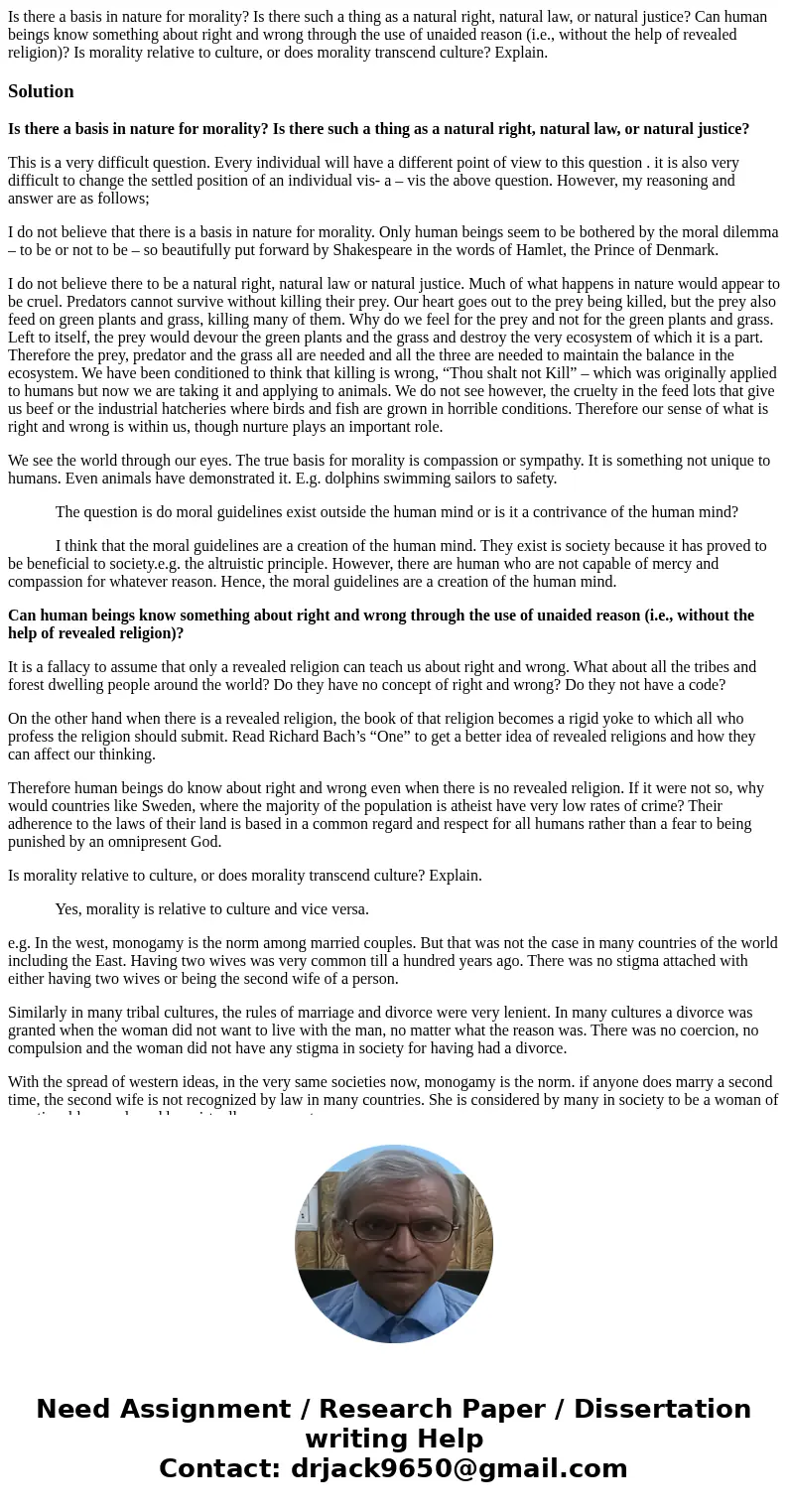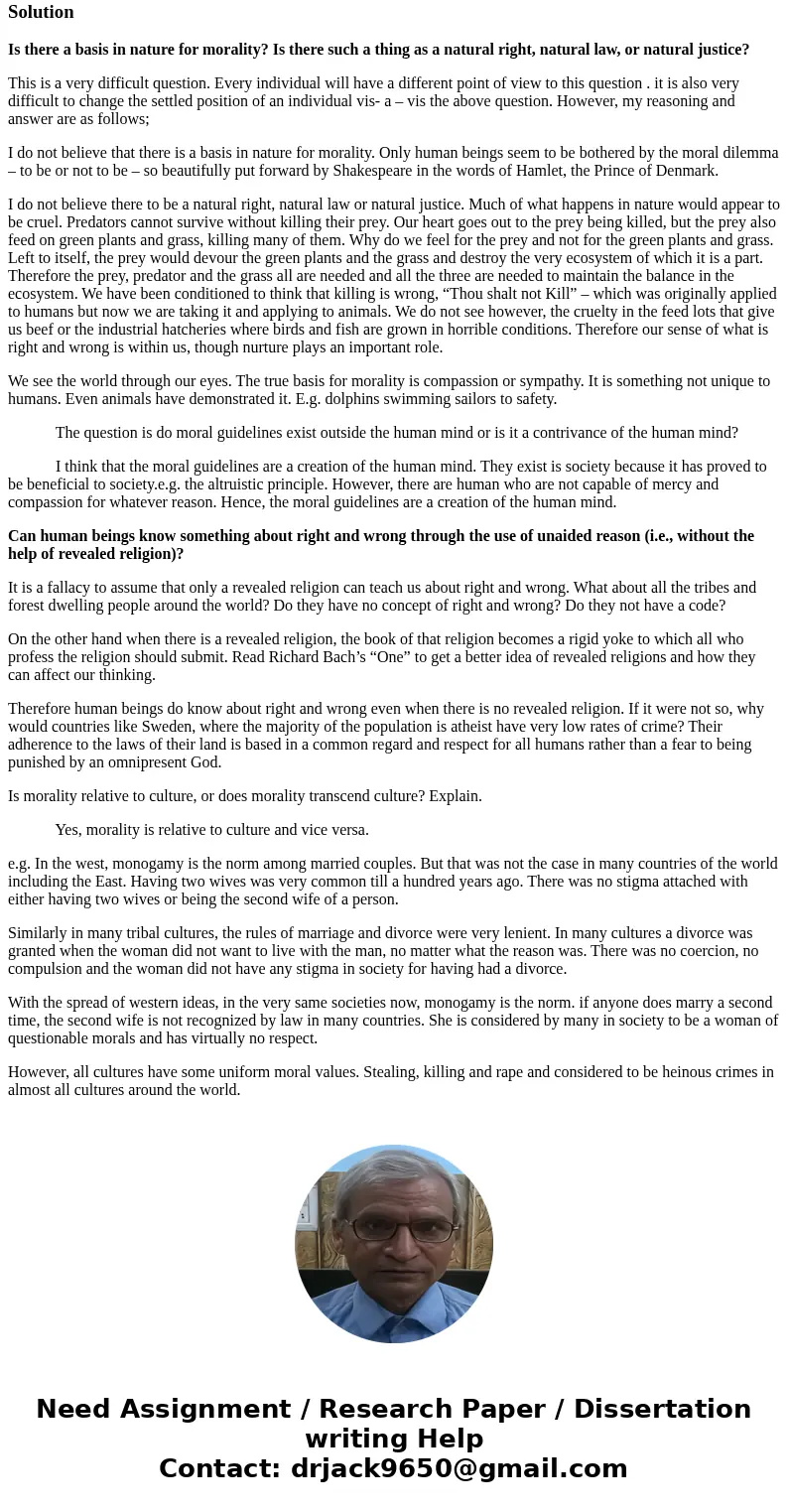Is there a basis in nature for morality Is there such a thin
Is there a basis in nature for morality? Is there such a thing as a natural right, natural law, or natural justice? Can human beings know something about right and wrong through the use of unaided reason (i.e., without the help of revealed religion)? Is morality relative to culture, or does morality transcend culture? Explain.
Solution
Is there a basis in nature for morality? Is there such a thing as a natural right, natural law, or natural justice?
This is a very difficult question. Every individual will have a different point of view to this question . it is also very difficult to change the settled position of an individual vis- a – vis the above question. However, my reasoning and answer are as follows;
I do not believe that there is a basis in nature for morality. Only human beings seem to be bothered by the moral dilemma – to be or not to be – so beautifully put forward by Shakespeare in the words of Hamlet, the Prince of Denmark.
I do not believe there to be a natural right, natural law or natural justice. Much of what happens in nature would appear to be cruel. Predators cannot survive without killing their prey. Our heart goes out to the prey being killed, but the prey also feed on green plants and grass, killing many of them. Why do we feel for the prey and not for the green plants and grass. Left to itself, the prey would devour the green plants and the grass and destroy the very ecosystem of which it is a part. Therefore the prey, predator and the grass all are needed and all the three are needed to maintain the balance in the ecosystem. We have been conditioned to think that killing is wrong, “Thou shalt not Kill” – which was originally applied to humans but now we are taking it and applying to animals. We do not see however, the cruelty in the feed lots that give us beef or the industrial hatcheries where birds and fish are grown in horrible conditions. Therefore our sense of what is right and wrong is within us, though nurture plays an important role.
We see the world through our eyes. The true basis for morality is compassion or sympathy. It is something not unique to humans. Even animals have demonstrated it. E.g. dolphins swimming sailors to safety.
The question is do moral guidelines exist outside the human mind or is it a contrivance of the human mind?
I think that the moral guidelines are a creation of the human mind. They exist is society because it has proved to be beneficial to society.e.g. the altruistic principle. However, there are human who are not capable of mercy and compassion for whatever reason. Hence, the moral guidelines are a creation of the human mind.
Can human beings know something about right and wrong through the use of unaided reason (i.e., without the help of revealed religion)?
It is a fallacy to assume that only a revealed religion can teach us about right and wrong. What about all the tribes and forest dwelling people around the world? Do they have no concept of right and wrong? Do they not have a code?
On the other hand when there is a revealed religion, the book of that religion becomes a rigid yoke to which all who profess the religion should submit. Read Richard Bach’s “One” to get a better idea of revealed religions and how they can affect our thinking.
Therefore human beings do know about right and wrong even when there is no revealed religion. If it were not so, why would countries like Sweden, where the majority of the population is atheist have very low rates of crime? Their adherence to the laws of their land is based in a common regard and respect for all humans rather than a fear to being punished by an omnipresent God.
Is morality relative to culture, or does morality transcend culture? Explain.
Yes, morality is relative to culture and vice versa.
e.g. In the west, monogamy is the norm among married couples. But that was not the case in many countries of the world including the East. Having two wives was very common till a hundred years ago. There was no stigma attached with either having two wives or being the second wife of a person.
Similarly in many tribal cultures, the rules of marriage and divorce were very lenient. In many cultures a divorce was granted when the woman did not want to live with the man, no matter what the reason was. There was no coercion, no compulsion and the woman did not have any stigma in society for having had a divorce.
With the spread of western ideas, in the very same societies now, monogamy is the norm. if anyone does marry a second time, the second wife is not recognized by law in many countries. She is considered by many in society to be a woman of questionable morals and has virtually no respect.
However, all cultures have some uniform moral values. Stealing, killing and rape and considered to be heinous crimes in almost all cultures around the world.


 Homework Sourse
Homework Sourse